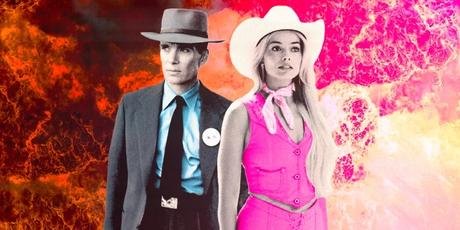
Oppenheimer and Barbie - or, more poetically, Barbieheimer
"Oh, How I Hate to Get Up in the Morning"The opera world over in Europe but especially in the U.S. of A. has been undergoing quite the momentous change of late. Turmoil, if you don't mind the expression, has become the norm. It's developing into more of a burden than a boon to lovers of the art form. In similar fashion, the movies and the movie industry as a whole have been hit with bombs, bombs, and more bombs - both literally and, well, figuratively speaking to boot!
The past year's box-office boxing contest between Oppenheimer and Barbie, which ended in a virtual draw, brought unsuspected sighs of relief for the (ahem) "security" and efficacy of the cinema, at least for the time being. But I wouldn't rest on my laurels if I were them. Online streaming services have permanently and irrevocably taken over the limelight, at least for the foreseeable future.
Meanwhile, pathbreaking operatic works, along with old war horses in new clothes, have draped the staid Metropolitan Opera House's stage over the past few seasons alone. While the current season continues to hobble along its pathetic path, at last look the plethora of new productions have taken on a veritable "ho-hum, so what's next on the agenda" attitude. "Relevance," that dirty little term of art, is once again rearing its head and in vogue at that venerable institution, with decidedly mixed results.
Where to turn? What to do? Who to call?
Well, in my book it's time to take stock of where we are and where we have been. In other words, to rehash my "Short Takes" outlook on the season's past and possible future. A critical, if not too judgmental (hah!), look at what worked and what didn't, and not just about the opera.
Yes, we're in for a bumpy ride of puns!
Paris, Texas (1984)German director Wim Wender's heartfelt paean to the American Southwest and his love for all things nostalgic reached its summit in this classic cinematic take of a loner's return to his roots.
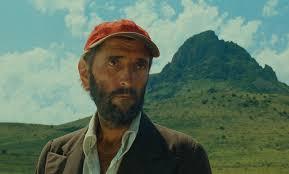
Travis (Harry Dean Stanton) in Wim Wenders' Paris, Texas (1984)
Filmed on location and starring the repressible, dour-faced craggy emblem of the arcane, the inscrutable character actor Harry Dean Stanton, who gives an Academy Award-standard performance of haunting melancholy and repressed emotions.
This beautifully photographed film also boasts sterling turns from every cast member. That incredible Ry Cooder slide guitar music score - a classic by any definition of the term - vibrates with subliminal meaning at every turn and every time it plays. A certifiable classic through and through!
Relationships are broken, re-established, and then broken again in a truly moving yet lowkey picture that takes its sweet time to get to where it wants to go. But don't let that lull you into inaction, it's well worth the extra mile and effort to stick with this one - right up until the end.
There are no murders or bank robberies to speak of, nor are there any so-called "action sequences" or endless car chases to disrupt the quiet and solitude. Instead, an atmosphere of calm descends upon the whole proceedings, one that is maintained and carried through right up until the end. All of which are to this picture's credit.
8½ (1963)A certifiable puzzler of a foreign feature when it first came out in the early sixties, this Federico Fellini-directed and produced work, which many film scholars and avid fans claim to have been the director's finest picture, is a real oddity of a showpiece.
Fellini, who was known in Italy and abroad as a maverick and an inveterate innovator and spinner of tall tales, took the Italian neorealist style to its ultimate extreme in this highly eccentric, peculiarly semiautobiographical depiction of a veteran filmmaker (played by perennial Fellini and Vittorio De Sica leading man, Marcello Mastroianni) who struggles with ennui and lack of (cough, cough) "direction."
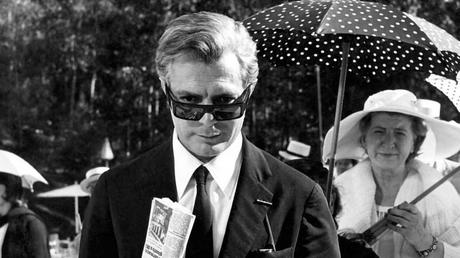
Marcello Mastroianni in Federico Fellini's 8 1/2 (or Otto e mezzo) from 1963)
Marcello's got the screen equivalent of writer's block, to put it plainly, which either prevents him from shooting a makeshift science-fiction epic (with no visible script and a modest, shoestring budget) or an ad hoc musical extravaganza.
In our estimation, the picture's focus is more about (and you can agree or disagree with this reading) Signor Fellini as Tuscan opera composer Giacomo Puccini, or (if it pleases you) Maestro Puccini as movie director Fellini. Fundamentally, it's the auteur theory in action, a wild and utterly bizarre view of a filmmaker as both creator and creation, a self-directed study of a showman who's run out of ideas. So he turns the focus back on himself and his problems: with finances, with hangers on, with fallen women (a favorite Fellini topic), and with cinema itself.
Oh, yes, it's odd and it's weird, yet in the end winds up being neither here nor there. It's certainly everything, everywhere all at once (poke, poke). A "takeoff" if you will, and a true curiosity piece. And that's being kind!
Fire Shut Up in My BonesJournalist and writer Clarence Blow's autobiographical tome about his early life as a victim of sexual abuse has been turned into an opera by jazz and film-score composer and musician Terence Blanchard.
The opera, such as it has evolved over the years, finally had its long-awaited debut at the austere Metropolitan Opera House. We'll take a deeper dive into this moving, emotionally laden work at a later date.
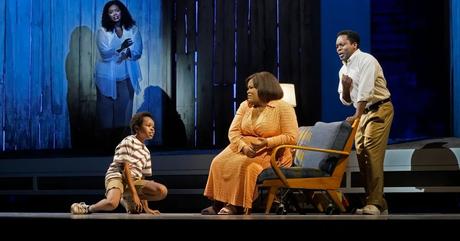
T erence Blanchard's Fire Shut Up in My Bone s (Photo: Metropolitan Opera House)
But for now, our main reaction to this piece is that the book, along with its stage adaptation, is equivalent to putting one's hand into an open wound: You try to stop the bleeding, although it continues to hurt like hell. The pain, the soreness, the festering injury and the disgust at how and what you feel completely takes over and overwhelms you.
Despite it all, you try to plow on and through. To bind the wound somehow, sometime. Still, you must plow on - despite the pain and hurt, self-knowledge and self-acceptance being at the heart of it all. A most difficult work to absorb in one sitting. There are notable comparisons to the Gershwins' Porgy and Bess, which are as inevitable as they are unavoidable.
"What Time's the Next Swan?" - A Long Awaited Lohengrin Returns to the MetIt's been a long time coming, folks. Ever since outré director Robert Wilson and his decades old Kabuki/Noh Theater version of the knight in (no) shining armor ever-so-slowly crossed the Met Opera stage, there have been no performances of Wagner's romantic opera Lohengrin at all - that is, until now.
Personally, I happen to adore this work: so beautiful, so gorgeous, and, in the best case scenario, one where the viewer is constantly reminded of a living, breathing medieval pageant taking place before one's eyes. Certainly, Wieland Wagner's fairytale setting of his grandfather's work at Bayreuth (in the mid-1960s) had aspired to pave the way for many of my generation as the standard bearer in how this opera should be presented onstage.
However, lately there have been dozens upon dozens, if not numerous modern interpretations of the story of a Christ-like figure, a guardian of the Holy Grail, whose father, Parsifal, happened to have been Wagner's final take on the legend of the poor fool made wise through compassion. Remember, Lohengrin the opera came first, while Parsifal came last, but Parsifal the character was, in fact, Lohengrin's father (how THAT situation came about is never explained - pure fool indeed!).
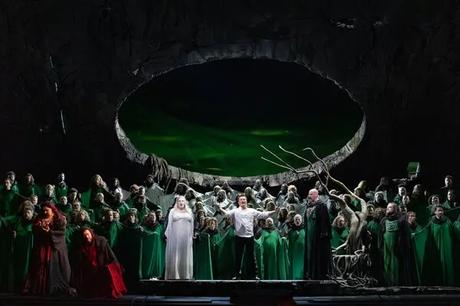
The Met Opera Lohengrin, staged by Francois Giraud, with Piotr Beczala as Lohengrin
With that out of the way, what can one do with such a dislikable character as Frederick of Telramund? He's a cardboard villain, a veritable mama's boy easily manipulated by his heathen housewife, the powerful witch Ortrud. A worthless weakling egged on by an evil force, the high and difficult tessitura for Telramund is pure torture for any singer willing to tackle this ungrateful part. Russian baritone Yevgeny Nikitin did about as well as any singer could do with the put-upon knight. However, his bark in this instance was about as worse as his bite, the humanity of this two-dimensional being coming out in tiny snippets. That Nikitin avoided making a meal out of this punishing assignment is high praise in itself.
As for the wicked Ortrud, kudos indeed to soprano Christine Goerke for giving powerful life to such a vile villainess, one so loathsome that the listener simply cannot be blamed for thinking that Wagner lavished his finest dramatic writing on this creature alone. A good or even mildly passable performance always seems to pass muster with audiences. Here, the result was stupendous in Goerke's capable hands (or voice, for that matter).
As for the title role, it was literally and quite figuratively a godsend! Not since the halcyon days of Jess Thomas and Sándor Kónya - two worthy exponents of the virtuous swan knight - has the part of Lohengrin been so wonderfully and expressively sung and acted. Polish tenor Piotr Beczala exceeded himself in delivering mellifluous tones and gorgeous, long-lined legato singing, not to mention potent, full-throated pronouncements with equal abandon.
At once princely and regal, at other times caring and tender, Beczala had power in reserve for his grueling third-act encounters, the voice unleashed at just the opportune time. His romantic conception of the part, as defender of what's right and as Elsa's champion, while earlier held in check, was finally released at key moments, to include a ravishingly lovely, "Ich liebe dich" ("I love you") to his intended bride. I bet half the audience swooned at that phrase!
As worthy of mention as Beczala's performance was, all honor and praise surely must go to the Met Opera Chorus members who out sang and easily outranked even the mighty Met Opera Orchestra, to chorus master Donald Palumbo's deserving credit. I have never heard such an ovation for a chorus, a well-merited and never-too-late recognition of how prominent and vital a part these voices meant to Wagner's most popular stage piece.
As for Francois Giraud's conception, it was basically in line with his earlier and immensely popular Parsifal, yet nowhere near as moving or absorbing. Dark storm clouds hovered above the participants, topped off by an obvious hole in the ceiling - reminiscent, to some extent, of the crack in the earth that Parsifal enters into when he pays a visit to the evil Klingsor's magical kingdom. We need not add that Met maestro Yannick Nézet-Séguin presided over the entire affair. He drew some ethereal sounds from the string section, along with the mighty brass element so essential to the overall success of this work.
Schindler's List (1993)In Stephen Spielberg's epic production, we want to make our heroes into paragons of virtue. Unfortunately, many of them are not, nor do they realize that the so-called "good" they do comes from a different part of their being.
These "heroes" are only too human, with all the pluses and minuses, the faults, the false starts, the unsteady and tentative steps toward realization. Many trip over their own feet, or fall all over themselves in trying to do what is right. But what is right? What is wrong? Are they both in the viewer's eyes? What of the participants in the drama? How do they capture the essence of what is right and what is wrong? And what of the evildoers? Is there such a thing as good and evil?
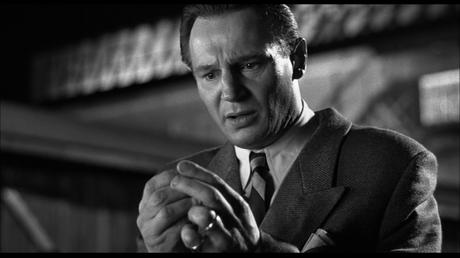
Liam Neeson as Oskar Schindler in Spielberg's Schindler's Lis t (1993)
Spielberg recognized this dichotomy in his characters, especially that of Oskar Schindler. Those so-termed pluses and minuses simply could not, would not cancel each other out. We are not the stuff that mathematics or higher arithmetic make of us. We are humans, fallible and incorrigible humans. But we can learn from our mistakes. It's what makes us human after all.
It's what made Schindler human, when he finally admits to himself that he could have done more, he could have saved more of "his" Jews. At the end, Schindler breaks down in tears. Still, he is reassured by those same survivors, the eleven hundred or so "Schindler Jews," who were witnesses to the struggle. From this tiny fraction rose a mighty wall of descendants, a testimony to what is right for those who hold true to the concept that we all share the burden of looking out for humanity. For in preserving humanity, we preserve what is human and humane in us all.
(End of Round Two)To be continued...
Copyright © 2024 by Josmar F. Lopes
